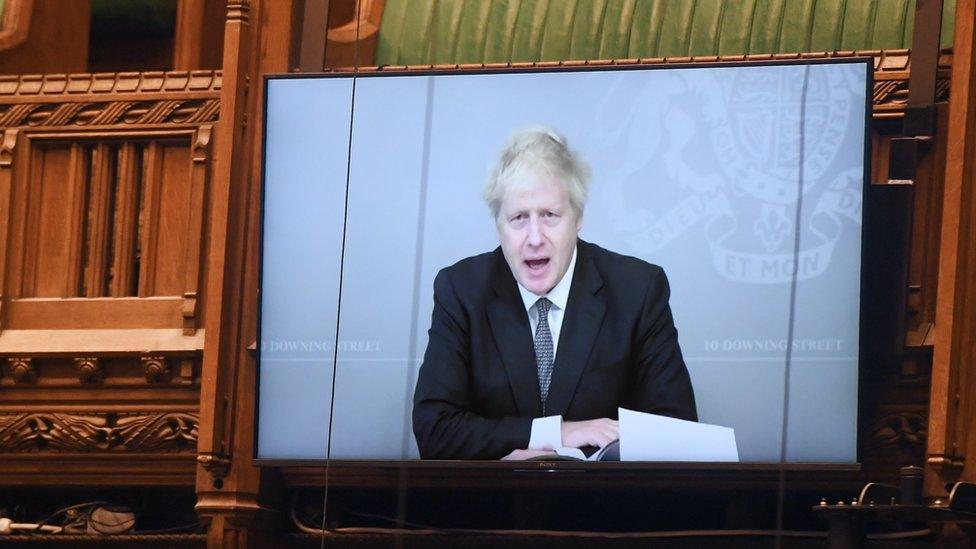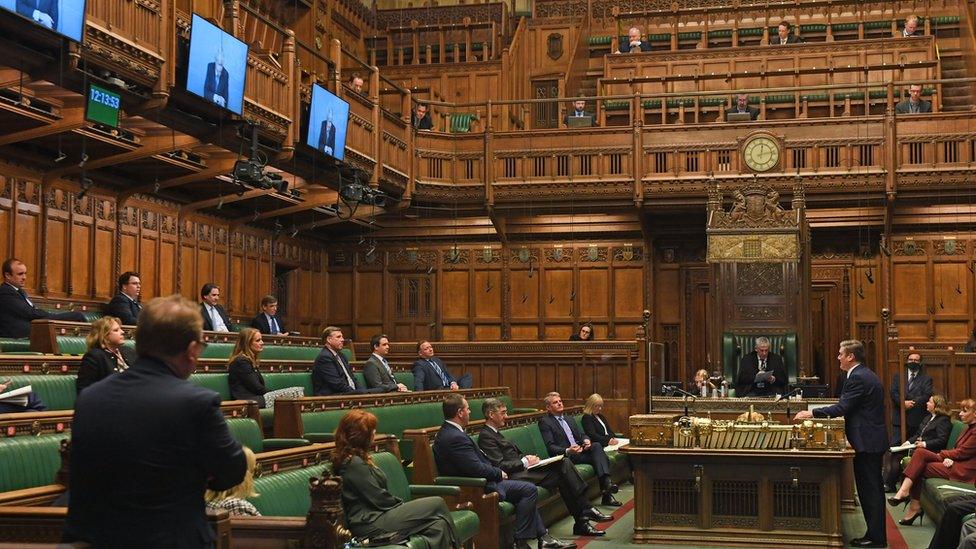Covid: Boris Johnson appears at Prime Minister's Questions via video
- Published

The prime minister appeared on screen, rather than in person at the dispatch box
Boris Johnson has become the first prime minister in history to conduct his weekly question-and-answer session with MPs via video link, as he continues to self-isolate.
He is working from 10 Downing Street after coming into contact with fellow Conservative MP Lee Anderson, who later tested positive for coronavirus.
The PM decided to take questions rather than see deputy Dominic Raab fill in.
Labour leader Sir Keir Starmer was in the Commons chamber as usual.
Up to 50 MPs are currently allowed in at any one time, with remote contributors using Zoom to ask questions and respond to ministerial statements.
The PM faced a mixture of virtual questions and ones from MPs present in the chamber during the 40-minute session, including from the SNP's Westminster leader Ian Blackford and Douglas Ross, the Scottish Tory leader.
As PMQs ended, Speaker Sir Lindsay Hoyle said he wanted to put a "big thank you" on record to the staff in parliament's broadcasting unit for "making today happen".
On his Downing Street video link, the PM called "hear hear".

Commons leader Jacob Rees-Mogg was seen to be occupying the PM's normal position during the exchanges
The format is set to be repeated at next week's Prime Minister's Questions.
Mr Johnson could also make a number of Commons statements via video link before his self-isolation ends on 26 November, including one on Thursday on the government's review of foreign and defence policy.


There was some scepticism - and curiosity - about how a virtual PMQs would work.
Remember this is the first time ever that a prime minister has dialled in remotely to the Commons chamber.
The Downing Street wifi did at least hold up but it was certainly not the liveliest of exchanges.
However the traditional "bear pit" atmosphere (that some like and others loathe) has been lacking for a while since they put limits on the number of MPs allowed in the chamber.

The FDA senior civil servants' union has argued that Mr Johnson's use of a video link to answer questions shows a fully "hybrid" Parliament - using video conferencing across all parliamentary business - is possible.
National officer Jawad Raza told the BBC it was "unconscionable that an exception be made to suit the prime minister, but not to protect the health and safety of everyone working across the parliamentary estate".
He added: "This doesn't just mean MPs, as hundreds of House staff work on the estate to support the work of parliamentarians and facilitate the UK's democratic processes."
On Monday, Mr Rees-Mogg gave way to an appeal from Conservative MP Tracey Crouch - who is receiving treatment for cancer - for more video participation for those who are clinically extremely vulnerable.
A motion aimed at making this happen will be debated on Wednesday.

What is self-isolation?
Self-isolation means staying at home and not leaving it - even to buy food, medicines or other essentials, or for exercise.
If you are told to self-isolate by NHS Test and Trace or the NHS Covid-19 app, you must self-isolate for 14 days, external from the day you were last in contact with the person who tested positive for coronavirus.
And if you develop symptoms during the 14-day period, you should get a test as soon as possible.
If the result is negative, you should continue isolating for the rest of the 14 days.
If positive, you should self-isolate for at least another 10 days from when your symptoms started.

But Mr Rees-Mogg said he was resistant to widening the concession, insisting other MPs must "behave as other key workers do".
The prime minister - who was admitted to intensive care with Covid-19 in April - is working from an office in No 10 that he can reach from his flat in No 11 without coming into contact with Downing Street staff.
A government spokesman said the public was "best served when Parliament meets physically to the fullest extent possible".
He added: "The [House of Commons] Speaker has worked hard with the House authorities to create a safe Covid-secure workplace for all who need to attend so that, just as teaching and medical professions are working in person to keep the country moving, so are MPs and peers."